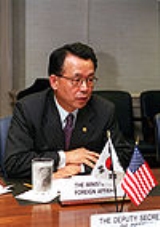
Prime Minister of South Korea
Encyclopedia
The Prime Minister of the Republic of Korea is appointed by the President
with the National Assembly
's approval. Unlike prime minister
s in the parliamentary system
, the Prime Minister of South Korea is not required to be a member of parliament.
The Prime Minister
assists the President, supervises ministries, and recommends ministers. The Prime Minister is the first in the order of succession to discharge the duties of the office of the President as the acting-president should the president be unable to discharge his office. The last person to have served as the acting-president was Goh Kun
during the impeachment trial of President Roh Moo-hyun
in 2004.
The position was created in August 1948, when South Korea
was founded, and was held by Lee Bum Suk
until 1950. The title was Chief Cabinet Minister from 1961 until 1963.
A Prime Minister appointed by the President but not confirmed by the Assembly is known as the acting Prime Minister. The Prime Minister becomes acting president if the president dies, resigns or is impeached.
President of South Korea
The President of the Republic of Korea is, according to the Constitution of the Republic of Korea, chief executive of the government, commander-in-chief of the armed forces, and the head of state of the Republic of Korea...
with the National Assembly
National Assembly of South Korea
The National Assembly of the Republic of Korea is a 299-member unicameral legislature. The latest general elections were held on April 9, 2008. Single-member constituencies comprise 245 of the National Assembly's seats, while the remaining 54 are allocated by proportional representation...
's approval. Unlike prime minister
Prime minister
A prime minister is the most senior minister of cabinet in the executive branch of government in a parliamentary system. In many systems, the prime minister selects and may dismiss other members of the cabinet, and allocates posts to members within the government. In most systems, the prime...
s in the parliamentary system
Parliamentary system
A parliamentary system is a system of government in which the ministers of the executive branch get their democratic legitimacy from the legislature and are accountable to that body, such that the executive and legislative branches are intertwined....
, the Prime Minister of South Korea is not required to be a member of parliament.
The Prime Minister
Prime minister
A prime minister is the most senior minister of cabinet in the executive branch of government in a parliamentary system. In many systems, the prime minister selects and may dismiss other members of the cabinet, and allocates posts to members within the government. In most systems, the prime...
assists the President, supervises ministries, and recommends ministers. The Prime Minister is the first in the order of succession to discharge the duties of the office of the President as the acting-president should the president be unable to discharge his office. The last person to have served as the acting-president was Goh Kun
Goh Kun
Goh Kun is a South Korean politician. He served as Prime Minister of South Korea from 1997 to 1998 and from 2003 to 2004...
during the impeachment trial of President Roh Moo-hyun
Roh Moo-hyun
Roh Moo-hyun GOM GCB was the 16th President of South Korea .Roh's pre-presidential political career was focused on human rights advocacy for student activists in South Korea. His electoral career later expanded to a focus on overcoming regionalism in South Korean politics, culminating in his...
in 2004.
The position was created in August 1948, when South Korea
South Korea
The Republic of Korea , , is a sovereign state in East Asia, located on the southern portion of the Korean Peninsula. It is neighbored by the People's Republic of China to the west, Japan to the east, North Korea to the north, and the East China Sea and Republic of China to the south...
was founded, and was held by Lee Bum Suk
Lee Beom-seok (Prime Minister)
Lee Beom-seok was a Korean independence activist and first prime minister of South Korea from 1948 to 1950. For a time, he also headed the Korean Youth Corps .-Notes:...
until 1950. The title was Chief Cabinet Minister from 1961 until 1963.
A Prime Minister appointed by the President but not confirmed by the Assembly is known as the acting Prime Minister. The Prime Minister becomes acting president if the president dies, resigns or is impeached.
See also
- List of Prime Ministers of South Korea
- List of Prime Ministers of Korea (1895–1910)
- List of Korea-related topics
- Politics of South KoreaPolitics of South KoreaPolitics of the Republic of Korea takes place in the framework of a semi-presidential representative democratic republic, whereby the President is the head of state, and of a multi-party system. Executive power is exercised by the government. Legislative power is vested in both the government and...
External links
- List of Prime Ministers, with photos
- South Korea at worldstatesmen.org

